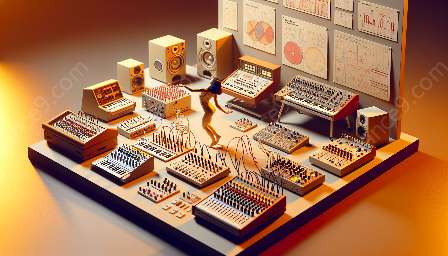Electronic music has a rich history that has evolved over time, shaping the dance & electronic music industry and modern production techniques. In this article, we will explore the origins of electronic music, its impact on the music industry, and how modern production techniques have transformed the genre.
Origins of Electronic Music
The roots of electronic music can be traced back to the early 20th century, with the invention of electronic instruments such as the theremin and the Telharmonium. These early electronic instruments laid the groundwork for the development of electronic music as a genre.
One of the most significant milestones in the history of electronic music was the invention of the synthesizer. In the 1960s, pioneers like Robert Moog and Don Buchla developed the first modular synthesizers, which allowed musicians to create new and innovative sounds that were not possible with traditional instruments.
Evolution of Electronic Music
As electronic music continued to evolve, new subgenres emerged, such as ambient, techno, house, and trance. These subgenres each brought their own unique sound and production techniques, contributing to the diversification of electronic music as a whole.
The 1980s saw the rise of electronic dance music (EDM), driven by the popularity of synthesizers, drum machines, and sequencers. The emergence of EDM paved the way for electronic music to become a dominant force in the music industry, influencing popular culture and shaping modern production techniques.
Modern Production Techniques
Advancements in technology have revolutionized the production of electronic music. Digital audio workstations (DAWs), software synthesizers, and sampling techniques have become essential tools for modern producers, allowing for unparalleled creativity and flexibility in creating electronic music.
Furthermore, the rise of streaming platforms and social media has transformed the way electronic music is distributed and consumed, providing new opportunities for artists to reach global audiences and connect with fans.
Impact on the Music Industry
The impact of electronic music on the music industry cannot be overstated. Electronic music has influenced mainstream genres and inspired a new wave of producers and artists, leading to collaborations and crossovers between different musical styles.
Additionally, electronic music festivals and events have become major cultural phenomena, attracting millions of fans and contributing significantly to the global economy. The fusion of music and technology has created new business opportunities and revenue streams within the dance & electronic music industry.
Conclusion
The historical evolution of electronic music and modern production techniques has had a profound impact on the dance & electronic music industry. From its humble beginnings to its current status as a dominant genre, electronic music continues to shape the musical landscape and influence the way music is created, produced, and consumed.






























